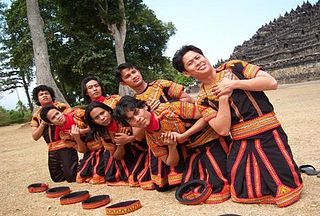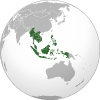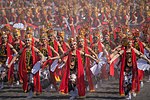
Aceh, officially the Province of Aceh, is the westernmost province of Indonesia. It is located on the northern end of Sumatra island, with Banda Aceh being its capital and largest city. It is bordered by the Indian Ocean to the west, Strait of Malacca to the northeast, as well bordering the province of North Sumatra to the east, its sole land border, and shares maritime borders with Malaysia and Thailand to the east, and Andaman and Nicobar Islands of India to the north. Granted a special autonomous status, Aceh is a religiously conservative territory and the only Indonesian province practicing Sharia law officially. There are ten indigenous ethnic groups in this region, the largest being the Acehnese people, accounting for approximately 70% of the region's population of about 5.5 million people in mid-2023. Its area is comparable to Croatia or Togo.

Gayo is an endangered Austronesian language spoken by some 275,000 people in the mountainous region of the Indonesian province Aceh on the Northern tip of the island of Sumatra, specifically around the Central Aceh, Bener Meriah and Gayo Lues regencies. It is classified as belonging to the Western Malayo-Polynesian branch of the Austronesian languages, but is not closely related to other languages. Ethnologue lists Bukit, Dëret, Lues, Lut, and Serbejadi-Lukup as dialects.

The culture of Indonesia has been shaped by the interplay of indigenous customs and diverse foreign influences. With over 600 distinct ethnic groups, including significant Austronesian and Melanesian cultures, contributing to its rich traditions, languages, and customs, Indonesia is a melting pot of diversity. Positioned along ancient trade routes between the Far East, South Asia, and the Middle East, the country has absorbed cultural practices influenced by Hinduism, Buddhism, Confucianism, Islam, and Christianity. These influences have created a complex cultural tapestry that often differs from the original indigenous cultures.

Gayo Lues Regency is a regency in the Aceh Special Region of Indonesia. It is located on the island of Sumatra. The regency was created on 10 April 2002 under Statute UU 4/2002 from the northern part of Aceh Tenggara. Its capital is Blangkejeren. The regency covers an area of 5,549.91 square kilometres and had a population of 79,560 at the 2010 Census and 99,532 at the 2020 Census; the official estimate as at mid 2023 was 104,856. Along with the Central Aceh Regency and the Bener Meriah Regency, it is home to the Gayo people.

Central Aceh Regency is a regency in Aceh province of Indonesia. It is located on Sumatra island. Formerly this regency covered a much larger area; on 4 June 1974, the Southeast Aceh Regency was separated from the Central Aceh Regency, and on 18 December 2003 the Bener Meriah Regency was separated from the remaining Central Aceh Regency.

Dance in Indonesia reflects the country's diversity of ethnicities and cultures. There are more than 600 ethnic groups in Indonesia. Austronesian roots and Melanesian tribal forms are visible, and influences ranging from neighboring Asian and even western styles through colonization. Each ethnic group has its own dances: there are more than 3,000 original dance forms in Indonesia. The old traditions of dance and drama are being preserved in the numerous dance schools which flourish not only in the courts but also in the modern, government-run or supervised art academies.
Takengon is a town in Aceh, Indonesia. The town itself sits on three administrative districts of the Central Aceh Regency - Bebesen, Kebayakan, and Lut Tawar, and acts as the seat of Central Aceh Regency. The town is in the highlands of western Sumatra, situated on the shores of Lake Laut Tawar. The region around Takengon is well known for its coffee. Takengon is a plateau with cool air at an altitude of about 1200 m above sea level.

Indonesia was the fourth-largest producer of coffee in the world in 2014. Coffee cultivation in Indonesia began in the late 1600s and early 1700s, in the early Dutch colonial period, and has played an important part in the growth of the country. Indonesia is geographically and climatologically well-suited for coffee plantations, near the equator and with numerous interior mountainous regions on its main islands, creating well-suited microclimates for the growth and production of coffee.

Acehnese is an Austronesian language natively spoken by the Acehnese people in Aceh, Sumatra, Indonesia. This language is also spoken by Acehnese descendants in some parts of Malaysia like Yan, in Kedah. Acehnese is used as the co-official language in the province of Aceh, alongside Indonesian.

The Acehnese, also written as Atjehnese and Achinese, are an indigenous ethnic group native to Aceh, Indonesia on the northernmost tip of the island of Sumatra. The area has a history of political struggle against the Dutch colonial rule. The vast majority of Acehnese people are Muslims. The Acehnese people are also referred to by other names such as Lam Muri, Lambri, Akhir, Achin, Asji, A-tse and Atse. Their language, Acehnese, belongs to the Aceh–Chamic group of Malayo-Polynesian of the Austronesian language family.
Likok Pulo is a traditional dance originating from Aceh, Indonesia. "Likok" means dance moves, while "Pulo" means island. Pulo here refers to a small island at the northern tip of Sumatra Island which is also called Breuh Island, or Beras Island.

The Gayo people are an ethnic group living in the highlands of Aceh Province, Sumatra, Indonesia. The Gayo tribe has a population of 336,856 and they live predominantly in the mountains. Most Gayo live in three regencies in Aceh namely Bener Meriah, Central Aceh, and Gayo Lues. Some of them live in several districts in other regencies, such as Serbejadi District, Simpang Jernih District, and Peunaron District in East Aceh Regency and Beutong District in Nagan Raya Regency. Other than that, the Gayo population also covers Southeast Aceh Regency and Aceh Tamiang Regency. Their homeland lies in the Barisan Mountains which has elevations of over 12,000 feet and extends more than one thousand miles. The Gayonese language has four dialects: Lut, Serbejadi-Lukup, Lut and Luwes. Their language does not have a writing system, but folk tales, stories and poetry are passed down in oral tradition. The traditional house of the Gayo is called Umah.

Saman is one of the most popular dances in Indonesia. Its origin is from the Gayo ethnic group from Gayo Lues, Aceh province, Indonesia, and is normally performed to celebrate important occasions. The dance is characterized by its fast-paced rhythm and common harmony between dancers. These two elements are key figures of Saman and are among the reasons Saman is widely known and practiced in Indonesia, besides being relatively easy to learn.

The Alas people is an indigenous ethnic group from Southeast Aceh Regency, Aceh, Sumatra, Indonesia. The Alas are found in the Gunung Leuser, Ketambe, and Alas River areas.

Deknong Kemalawati is an Indonesian poet. She is one of the leading poets of modern Indonesia, chairman of the Art Council Banda Aceh, and winner of the Literary Prize of the Government of Aceh.

Acehnese cuisine is the cuisine of the Acehnese people of Aceh in Sumatra, Indonesia. This cuisine is popular and widely known in Indonesia. Arab, Persian, and Indian traders influenced food culture in Aceh although flavours have substantially changed their original forms. The spices combined in Acehnese cuisine are commonly found in Indian and Arab cuisine, such as ginger, pepper, coriander, cumin, cloves, cinnamon, cardamom, and fennel.

Minangkabau culture is the culture of the Minangkabau ethnic group in Indonesia, part of the Indonesian culture. This culture is one of the two major cultures in the Indonesian archipelago which is very prominent and influential.

Muhammad Hasan Gayo was an Indonesian politician and journalist from Aceh. He was active in youth guerilla groups during the Indonesian National Revolution, and later worked as a journalist during the Sukarno period.






















